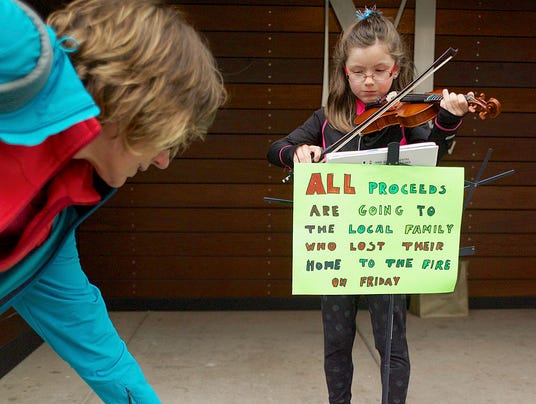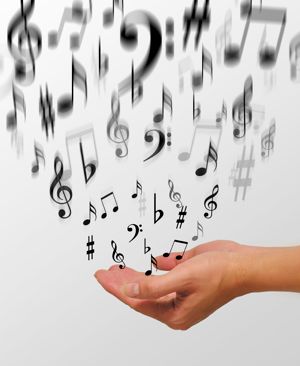Music is important, especially to children who are in pain and grief because music gives them something to look forward to each day. To know more about the power of music, read this LATimes.com article.
****
To help them cope with loss, therapist Arvis Jones uses music as a way to help children express how they feel.
How do you help little children, too young to know what death really means, cope with the feelings of grief and pain that the loss of a loved one brings?
If you're music therapist Arvis Jones, you let them bang on a drum, do the hokey-pokey or join a choir and sing.
Jones is part of a growing professional field that taps the restorative power of music to help traumatized children heal.
For 20 years, she's been going to crime scenes, hospitals, funerals and schools, reaching out to grieving families with a bin of unorthodox tools — keyboards, claves, jingle sticks, tambourines, djembe and tubano drums.
Music is a right-brained activity, she said. Listening, playing, dancing and singing all engage the mind's emotional sphere.
But it's not just neurobiology that makes the medium a valuable tool. "With grief, the pain is sometimes so deep it hurts too much for kids to talk about what they feel," Jones said. "Music breaks down their defenses. They think they're having fun."
That helps counselors like Jones create a safe space to address the anger, confusion and fear that loss generates in young lives.
For the children who survived a car accident that killed a sibling and left their mother in a coma, that meant dancing around her hospital room with wooden rainsticks and percussion rings. "They'd been too traumatized to even look at their mother," Jones said. "Getting comfortable helped them reconnect."
For the little boy who hadn't smiled since his father died, that meant singing with Jones' children's choir. "Suddenly you're up there on the stage and everyone's clapping for you," Jones recalled. "He was beaming, bowing to the crowd." He'd realized that his father's death didn't mean the end of joy in his life.
For the 8-year-old who'd been fighting his classmates since he found his brother's body after a suicide, that meant pounding a giant drum. He might not have been able to describe his rage, but he could hit Jones' drum as hard as he wanted.
And he could hug it to his chest and cry when Jones asked if he loved and missed his brother.
I'd always considered it airy-fairy; the notion that music can heal something as profound as grief.
Jones said that's not an uncommon view. "A lot of agencies don't want to be bothered with music therapy. They consider it frivolous — until they see it," she said.
She said it's becoming more widely used to help children deal with not just their own grief, but with the trauma of public tragedies. Jones was asked after the shooting at Sandy Hook Elementary School to share music therapy techniques that might help families recover.
"Death is not something we can hide from," she said. "But we have a hard time helping children talk about it."
Without encouragement, children tend to stay silent; some act out their pain in destructive ways.
She remembers a visit to a South Los Angeles middle school to talk with classmates of a boy whose sister had been stabbed to death. "I talked to the kids about what to expect … and asked if anyone had a similar experience," she said.
Hands all across the classroom went up. One boy said his mother had been beaten to death the year before. "The teachers didn't know. They don't ask," she said. "No one knows what to say in a situation like that. Then you wonder why the kid causes trouble in class."
On Thursday, at a conference on children's grief, I watched Jones share her music therapy techniques with teachers, social workers and counselors.
She had volunteers from the audience role-play children, displaying the routes that music can take:
A tough teenager can use rap lyrics to reveal emotions that are hard to claim. A silent preschooler can signal distress with the vigorous shake of a tambourine. A withdrawn child can learn to trust by becoming part of a handbell troupe. A hurting child can learn to self-soothe by humming Grandma's favorite tune.
Music isn't magic, Jones made clear. "Recovery is a process, not an event.... But music is a way for us to begin to listen to what children feel.
Jones is the assistant director of the Center for Grief and Loss for Children at the mental health agency Hathaway-Sycamores, which began hosting the grief conference 10 years ago.
Joan Cochran, the center's executive director, financed the first conference with her credit card. "They said no one would come," she recalled. Twenty people showed up. That was enough to keep her going. She had worked with hospice patients, and seen children overlooked in the mourning process.
This year, more than 500 people attended the Pasadena conference, where workshop topics ran the gamut from bereavement rituals to therapist burnout.
"People are desperate for answers," said Deanne Tilton Durfee, director of the county's Inter-Agency Council on Child Abuse and Neglect, which helped organize the conference. "They want to know how to do the right thing for children. And they want to know how to manage that without damaging their own lives."
Jones offered an answer in her workshop. "You have to feel the joy inside yourself to be able to reach kids," she told the crowd, waving her arms as music filled the conference room.
By the end of the session they were on their feet, gyrating to a James Brown tune.
Mark Begelman is a co-founder of Markee Music, which provides a world class facility where children can enhance their talents. Follow this Twitter page to know more about its services.




























.jpg)